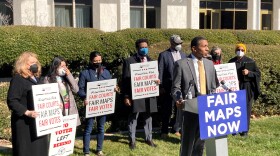During President Barack Obama’s 2008 campaign, some public discourse focused on the “blackness” of the President. Some on the right critiqued him for being “too black,” but some on the left claimed he was “acting white.”
“President Barack Obama, has these public moments, where he has to deal with the facts of race. He’s in this complicated situation where he has to appeal to members of multiple racial groups and have them all support him,” states Mitu Gulati, professor at Duke Law. “And then these instances occur as with Trayvon Martin, and he has both of these groups watching him so very carefully to see how Black is he or how Black isn’t he.”
Host Frank Stasio talks with Gulati and his co-author and fellow law professor Devon Carbado of UCLA School of Law. Their book, “Acting White? Rethinking Race in 'Post-Racial' America,” (Oxford University Press; 2013) addresses the question: “What does it mean to ‘act white’?”
Carbado and Gulati argue that race goes far beyond phenotype. It extends to the way one speaks, the clothes one wears, and the company one keeps. In “Acting White?” Carbado and Gulati look specifically at how the performance of one’s race connects to success in the work place.
“Acting White,” also pays close attention to the way gender presentation intersects with race in the workplace. Carbado uses hair as an example of something influencing perceptions of race. He describes the 1981 case of Rogers v. American Airlines which focused on the airline’s policy prohibiting braided hairstyles.
“Renee Rogers brings a lawsuit saying [the policy] is going to have a disparate impact on Black women. And the court says we don’t find actual discrimination,” Carbado explains. “This is around the time Bo Derek has this [braided] hairdo in the film Ten. The court actually credited American Airlines argument, that Bo Derek popularized the braided hairstyle, so this is not just an issue of African American women. Ignoring the extent to which it would have a clear disparate impact on Black women, specifically those who wear their hair in braids.”
What one does with the knowledge that “acting white” is valued in the workplace, is the next step, Carbado and Gulati claim. The first step is acknowledging that this imbalance exists.
“We think everyone works identity; everyone has some burden to fit in, including white heterosexual men,” says Carbado. “But at the same time, if you’re vulnerable to negative racial stereotypes, those burdens are greater.”









